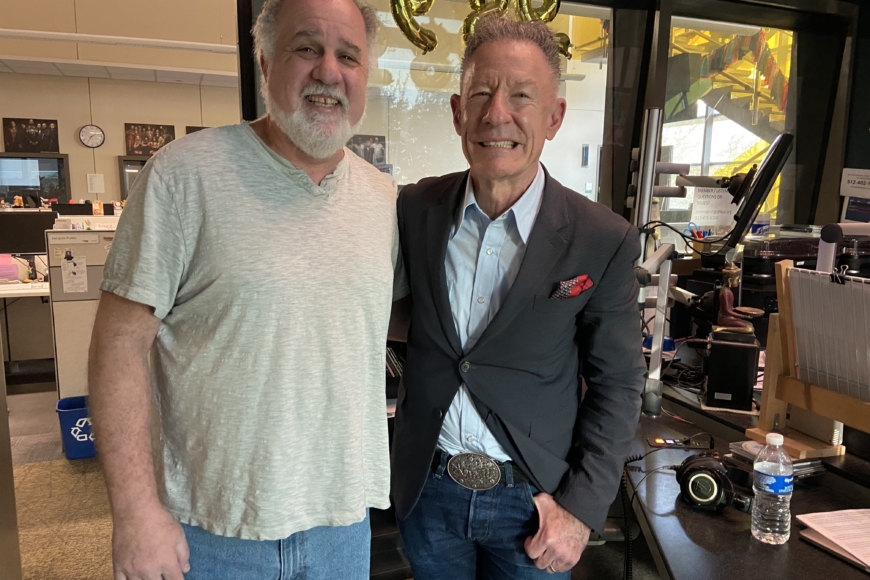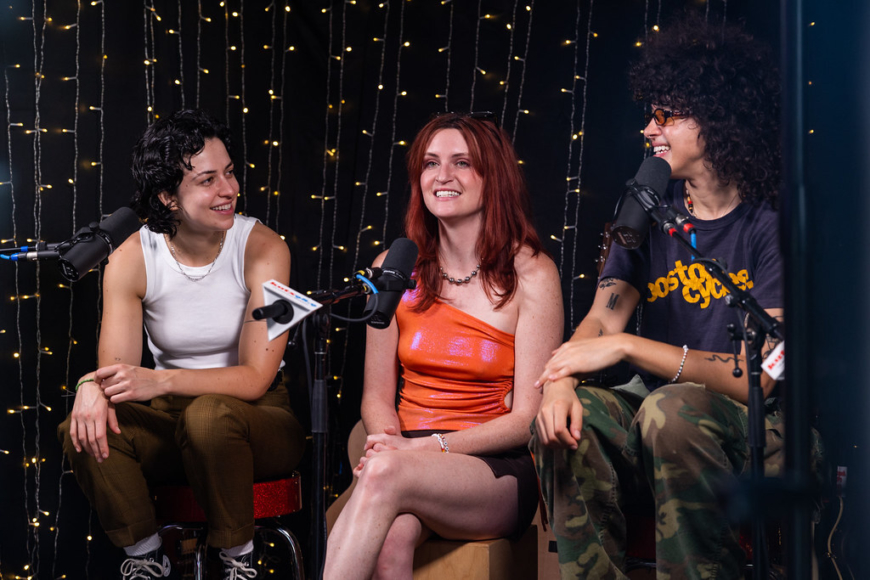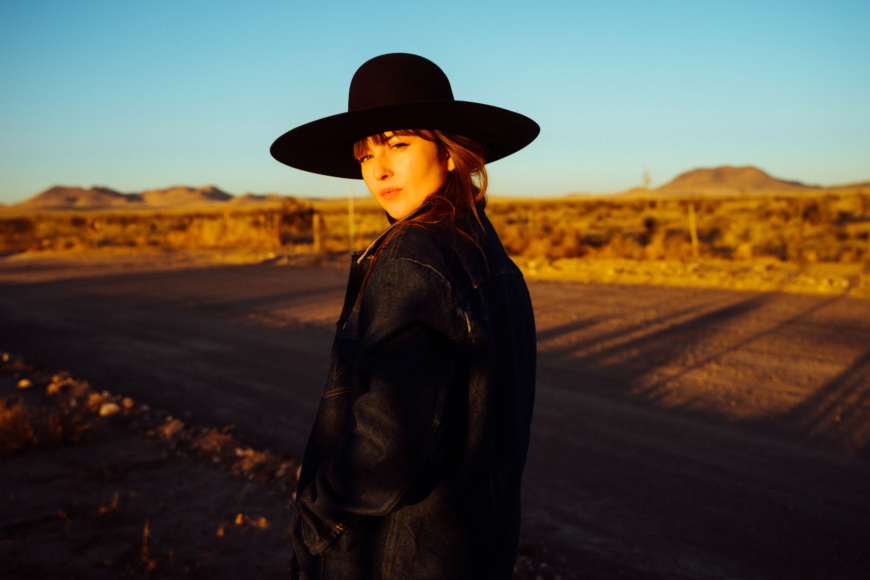Not long after he was asked to audition for Metallica to potentially replace the late Cliff Burton, bassist-extraordinaire Les Claypool and his three-piece Primus became household names thanks to virtuosic song structures, outrageous music videos, and a performance-first attitude. By the time Primus had entered the mainstream pop culture lexicon through Tony Hawk’s Pro Skater and South Park, Claypool had already begun to spread his wings and explore a range of collaborations. Over the past two decades, Claypool’s ever-growing repertoire has included Oysterhead, The Fancy Band, Duo de Twang, The Claypool Lennon Delirium, and of course, Colonel Claypool’s Fearless Flying Frog Brigade.
The Frog Brigade started off strong in the summer of 2000, wowing crowds with back-to-back live sets, typically closing with an album-wide cover of Pink Floyd’s Animals. However, since the release of two live albums in 2001 and the band’s sole studio LP, Purple Onion, in 2002 – The Frog Brigade’s stayed camouflaged and undercover. But with the recent return of Colonel Claypool’s Fearless Flying Frog Brigade for an expansive national tour (that features guests like Jerry Harrison & Adrian Belew: Remain in Light, W.I.T.C.H., The Budos Band, Neal Francis, and Moon Duo) Claypool chatted with KUTX Producer Jack Anderson over Zoom to discuss the Frog Brigade’s saga, family legacy, and the importance of variety.
KUTX: So Purple Onion came out September 2002. The Frog Brigade’s last major tour was summer 2003. It’s been 20 years. Now you’ve embarked on the Summer of Green tour with a new star-studded lineup. Why the lineup change and why come back now?
LC: Well, we came back now because there’ve been a lot of requests over the years for us to do this. So finally, you know, I’m in between Primus and Delirium and Oysterhead and whatever. Seemed like a good time to do it. As far as the lineup, our original keyboardist, Jeff Chimenti, he’s in Dead & Company and has been for years, so he’s a little busy. So I asked Sean [Lennon] if he would do it and he said yes. And then we thought, well let’s get Harry Waters ’cause he’s a buddy. And we got Harry and then Paulo Baldi; I’ve been playing with him for years. And then of course Mike Dillon I’ve been with for years. And then unfortunately, Skerik hasn’t been able to make it thus far ’cause he had an injury. But I’m hoping he’ll show up at some point. But it’s been blowing my mind how, how well this band has been gelling together and really excelling on in these performances. It’s an exciting thing to watch and it’s an exciting thing to be a part of.
KUTX: So on that note of Sean and Harry, when talking about The Claypool Lennon Delirium back in 2016, you once said that, “Sean definitely reflects his genetics, not just the sensibilities of his dad, but also the abstract perspective and unique approach of his mother.” As a Pink Floyd fan, and as someone who draws a lot of influence from Roger Waters’ technique, do you feel similarly now working with Harry?
LC: I mean, Harry is an incredible musician. I had never played with Harry before. He had done some stuff with The Dean Ween Group, so I knew he could do it, but I’m amazed how great of a musician he actually is. And it’s funny because as we’ve all gotten to know each other, I sit here and watch him and Sean, you know, playing jazz standards backstage. Basically, he’s like, Sean’s music teacher now. It’s pretty interesting to watch. But I think people are gonna be very surprised because, I dunno if you’ve noticed, but I tend to like to push people and so I was a little nervous when Skerik wasn’t gonna make it cuz Sker’s like, you know, you toss Sker the ball…that guy runs to the fucking end zone and beyond. Whereas a lot of people can be a little trepidatious at first. So watching Harry really start to step out, which he has been, is pretty incredible ’cause the guy can play, man. That guy can play. And I don’t think a lot of people have seen that ’cause he’s always been kind of in a supportive slot.
KUTX: So on that note of pushing people. With ‘Colonel Les Claypool’ front and center in this band’s handle, was there ever like a sense of imposter syndrome when you first started commanding these, like next-of-kin of two rock gods? Like, especially concerning a band that’s playing Beatles and Pink Floyd covers.
LC: I don’t even know what imposter syndrome is. I tend to be known as the guy that kind of carves my own trail. So it never really crossed my mind.
KUTX: Speaking of carving your own trails, you’re a father. How has working with Sean and Harry kind of informed your view of family legacy? Or in other words, have you ever kind of had an inkling, like your own fame creates unrealistic expectations of your own children, and how has working with Sean and Harry maybe kind of assuaged some of those possible concerns if there ever were any?
LC: I play with Sean and I play with Harry because of their abilities, not because of who they’re related to. And it’s funny because when I first was playing with Sean, even before I knew he was coming on the tour…like, a lot of people do think, “oh well this is the son of such and such. All the doors must open for them. Oh, it must be so easy, blah, blah, blah, blah.” It’s actually the polar opposite. You know, if you’re the son of Mozart, that’s a pretty hard shadow to get out of and make your own thumbprint. So Sean already starts with people going, “oh, well let’s see what you can do.” And my son experienced that when he was playing bass in school, ’cause he played upright bass at his Waldorf school. And he stopped because everybody was like, “oh, Claypool, let’s see what you can do.” And he said, “screw this”, and started playing banjo. So, you know, everybody wants to make their own way. Well, I guess I shouldn’t say everybody, but a lot of people do wanna make their own way and not necessarily just live in the shadow of what dad did. And the thing is, I’m just learning more about Harry in that department. But like I said, Harry’s a really surprising musician and now soloist and Sean has his own thing. Like you quoted me, he not only reflects his father, he reflects his mother and he’s his own person and he has a great thumbprint of his own.
KUTX: You once referred to the Flying Frog Brigade as your midlife crisis band. Could you explain a little bit more about what you meant and has that sentiment changed now that, you know, some of these songs that you’re covering are getting up to being a half century old? You know, you’re, it’s, it’s 20 years later. Do you feel any different? What did you mean by midlife crisis band?
LC: I think for me what Frog Brigade represented was it was born out of fear for one thing, because Primus was broken up. We said we were on hiatus, but that’s just a pussy way of saying, “oh, you know, maybe we’re gonna come back”. But we had broken up and here all of a sudden this thing that I had built for all these years was gone, and I was a little nervous. I had mortgages, I had little kids, so I grabbed some of my favorite musicians and stuffed them into an old Airstream motor home that I had and drove up and down the coast playing clubs. So it was a great therapeutic experience for me as well as a great learning experience. I would imagine that’s what I was referring to. As far as now, for me, variety is the spice of life. The more things I can do, the more new doors I can open, new paths I can go down. That makes me get up in the morning, makes me get out of the bed, you know? So this has been great.
KUTX: Speaking of variety, Concerning the number of strings on a bass all the way from the ol’ whamola up to a fretless six-string. I’m sure even a lot of seasoned bass players might see some novelty in those kind of instrument choices. But what are the benefits to writing and performing with these different bass types?
LC: Well, it’s a spice of life thing. I’ve always said bass is the crayon I just happened to pick out of the box. Well, a four-stringed bass for me is the easiest crayon to draw pictures with. So when I picked up that, when I had Carl Thompson make me a six-string, at first it was gonna be fretted and then I called him halfway through and said, “no, make it fretless”. Just to give myself more of a challenge. And then when I got the damn thing, I was like, “holy shit, what am I gonna do with this?”. It was a challenge and you need challenges in life. You need new things in life to keep the synapses firing and keep you moving forward, keep you interested. But I do tend to revert back to my four-string fretted instrument as what I’m most comfortable with. And then when you have a piece of metal with one string on it and a hinged lever, it’s always pretty fun to bang on that thing with a stick and just, it’s very primal. One of my favorite bass players ever was Mark Sandman. He had a two-string bass and the two strings were tuned in unison, and he was one of the most passionate, sultry bass players I’ve ever heard.
KUTX: But you’re also no stranger to upright or acoustic base. We heard that a lot in Duo de Twang. How does setting say, for example, by a campfire versus in the studio or practice space turning it up to 11, how does the setting affect your choice in instrumentation, be it acoustic versus electric, and what are some perks of playing acoustic that some strictly electric bass players might not even be hip to?
LC: You know, having an instrument that’s just comfortable is a wonderful thing. And playing something that’s different, uh, has a, uh, than what you would normally have, um, is gonna make you, uh, different things are gonna come outta you. You know, somebody had given me years ago this, this, I call it a Dobro bass, but it was a resonator bass and it sat for a long time. I was like, “yeah, what the hell’s this thing?” You know? And it just kind of sat. And then one day I picked it up and. And, and just started plunking away on it while I was working on this film soundtrack. And it, it had a cool, cool tone to it. So it, it just became one of those things that, that I kept around me and I used it quite a bit for, for warming up before gigs and then eventually doing the Duo de Twang stuff with my good buddy (Bryan) Kehoe. So I don’t know. I think every instrument…different things are gonna come out because it’s gonna have a different feel and timbre and whatnot.
KUTX: Historically, there are a lot of characters, a lot of masks, a lot of outfits, a lot of cartoons and costumes, especially with animals, you know, penguins, pigs, chimps, rubber ducks. I mean down to cowboys, Elvis, and flying aces. How important is character to your performance? And let’s just go ahead and say, not in the realm of music videos, ’cause obviously you wanna stand out in a music video and have your own kind of visual thing. But performance wise, how important is the visual costume to Les Claypool?
LC: Well, Stewart Copeland (of The Police and more recently, Oysterhead) always says the mask reveals the true self. A guy like Buckethead can’t even go on stage without his regalia. There’s certain things that come out back to putting yourself in a unique situation, whether it’s with a different instrument or putting on a hat or a mask or whatever. I’m not a big fan of going on stage, nor am I a fan of being onstage with people that are just wearing their street clothes. I feel like you’re paying to see a performance; you should see a performance of something that just adds a little twist to what you would see walking down the street. And I enjoy that from my audience. I think it’s amazing. When people are dressed as frogs or as penguins or as the pigs or whatever the hell it is I really enjoy that. It makes me happy. It makes me put on a better show. So if I’m not dressed like I’m walking down the street or going to the hardware store, I’m gonna put on a different show. It helps you step outta your skin a little bit. You know, some people use weed and alcohol to get to that space. I don’t. I put on my hat and my outfit, and then I feel like I’m ready to go. As far as the characters, I had no interest in being the lead singer of a band. My father tells me to this day, “you can’t sing for shit, but you can sure play that bass”. So, I always had these characters and I was more like the Mel Blanc or I would say I’m the narrator of Primus, and it wasn’t until I started doing Frog Brigade and all those bands in the 2000s that I actually became more comfortable with my voice and started singing ’cause I was working with Sean, who’s an amazing singer and does all these different layers and harmonies and stuff. It’s helped me grow. But again, it’s another thing where the more you can step outside your comfort zone or go in or try new things, that’s what keeps you waking up in the morning and getting out of bed, you know?
KUTX: Without necessarily naming names, has there ever been a potential collaboration you kind of had to put to bed because circumstances just weren’t right, or you didn’t gel with them? And if not, who else is out there that Les Claypool would love to work with, hypothetically?
LC: I’m not really sure. A lot of these aren’t things where I go, “wow, I wanna work with this person, let’s get this person”. It’s more casual than that, you know? I’ll stumble into a situation or me and Sean doing this project was his band opened for Primus and he and I just one day were jamming on our acoustics backstage. And I was like, “wow, there’s some cool shit coming out here. Come out to Rancho and let’s see what happens“. And that’s very casual. So I’m not really sure how to answer that. I’ve always been asked if you could pick one person, living or dead, who would you have wanted to play with? And John Bonham is usually the first thing that pops up, but, you know, I might have to wait that one out.
Catch Colonel Claypool’s Fearless Flying Frog Brigade in Dallas on Tuesday, June 13th, here in Austin at the Moody Amphitheater on Wednesday, June 14th, or in Houston on Friday, June 16th.



